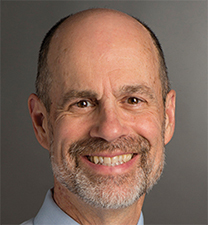Craig commended for his ‘remarkable and inspirational’ work with undergrads
, professor of biochemistry and head of the at the Rochester Institute of Technology, has won the …¨¿Ô∑¨ for his work promoting hypothesis-driven thinking in the undergraduate biochemistry lab.
“Paul’s work with students is remarkable and inspirational,” , a Rochester colleague, wrote in Craig’s nomination letter. Vacca noted that she seeks to follow in Craig’s footsteps by taking undergraduates into her group, seeking out those from underrepresented groups and reaching out to struggling students.
 It has been my privilege to work with remarkable colleagues and, most notably, outstanding students. I started as a professor in 1993 with some ideas about using computers in biochemistry education, but it has been the efforts of my students, mainly undergraduates, who have embraced these ideas and converted them into resources that others can use. Undergraduate students are capable of MUCH MORE than we imagine.” — Paul A. Craig
It has been my privilege to work with remarkable colleagues and, most notably, outstanding students. I started as a professor in 1993 with some ideas about using computers in biochemistry education, but it has been the efforts of my students, mainly undergraduates, who have embraced these ideas and converted them into resources that others can use. Undergraduate students are capable of MUCH MORE than we imagine.” — Paul A. Craig
Among his many accomplishments, Craig created the Bachelor of Science in biochemistry degree at the Rochester Institute of Technology, upgraded and published on the school’s biochemistry teaching lab, and obtained a National Science Foundation grant for an open-ended project-based biochemistry lab on six campuses, as detailed in his nomination letter.
Bateman, a longtime friend and professor of biomedical sciences at William Carey University, also noted Craig’s contribution to funding at the Rochester Institute of Technology in the form of NSF and National Institutes of Health grants and travel awards, all of which are related to biochemistry education. Craig also has 31 peer-reviewed publications and has given 38 national or international presentations.
Craig has been an ASBMB member since 1998 and is an active participant in the society. Judith Voet, a professional colleague and emeritus professor in the department of chemistry and biochemistry at Swarthmore, supported Craig’s nomination, calling him a “major guru of biochemistry software development, molecular visualization techniques and bioinformatics education.” Voet specifically noted Craig’s educational software that simulates polyacrylamide gel electrophoresis, which was valuable to her laboratory. As part of an ASBMB digital library initiative, Craig created Biomolecules Alive, a website to establish a “peer-review method for software and web applications that would give faculty members journal citations for their work in those areas.” He also contributed bioinformatics exercises for biochemistry textbooks, which are freely available.
Craig earned his Ph.D. at the and then held a postdoctoral position in biophysical chemistry at the in Detroit. He worked as an analytical biochemist at in Ann Arbor, Michigan, and was a visiting scholar at the .
Craig will receive his award during the 2018 ASBMB Annual Meeting in San Diego, where he will deliver an award lecture titled “Promoting hypothesis-driven thinking in the undergraduate biochemistry lab.”
The presentation will take place at 2:30 p.m. April 22 in Room 6C in the San Diego Convention Center.
Enjoy reading ASBMB Today?
Become a member to receive the print edition four times a year and the digital edition monthly.
Learn moreGet the latest from ASBMB Today
Enter your email address, and we’ll send you a weekly email with recent articles, interviews and more.
Latest in People
People highlights or most popular articles

In memoriam: Michael J. Chamberlin
He discovered RNA polymerase and was an ASBMB member for nearly 60 years.

Building the blueprint to block HIV
Wesley Sundquist will present his work on the HIV capsid and revolutionary drug, Lenacapavir, at the ASBMB Annual Meeting, March 7–10, in Maryland.

In memoriam: Alan G. Goodridge
He made pioneering discoveries on lipid metabolism and was an ASBMB member since 1971.

Alrubaye wins research and teaching awards
He was honored at the NACTA 2025 conference for the Educator Award and at the U of A State and National Awards reception for the Faculty Gold Medal.

Designing life’s building blocks with AI
Tanja Kortemme, a professor at the University of California, San Francisco, will discuss her research using computational biology to engineer proteins at the 2026 ASBMB Annual Meeting.

Jordahl named Gilliam Fellow
He will receive three years of funding to support his thesis research.

